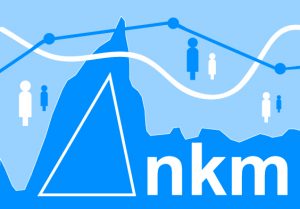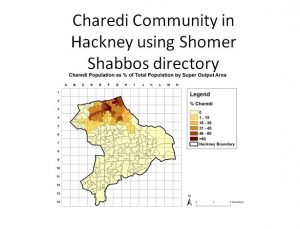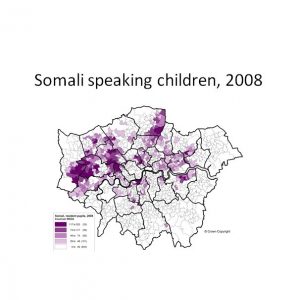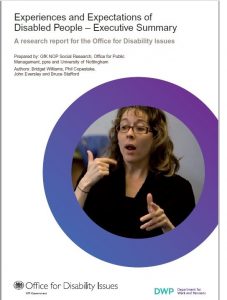Neighbourhood Knowledge Management
In the early 2000s Les Mayhew of City University demonstrated the potential for joining together administrative information spanning more than one agency (for example, health, local authority and police) to a range of local issues including population estimation. A chance meeting with John Eversley, highlighted the value of collaborating to add more datasets and to demonstrate new applications. John Eversley was drawing on earlier research he had done using pupil level data on languages spoken by school children (e.g. Baker and Eversley, 2000). We branded the process Neighbourhood Knowledge Management (NKM) – a reference to a government policy priority at the time.

Over a period of ten years or so, ppre working in conjunction with Professor Les Mayhew, Gillian Harper and other associates we undertook many assignments for central and local government, health care commissioners and providers – individually and in partnerships, which covered, for example:

- Population profiling of districts and localities with particular regard to populations which might not have been identified in censuses such as the Turkish/Kurdish, Somali and Charedi (Ultra-Orthodox Jewish) communities or where the population might have changed substantially – see Waples and Eversley (2013) and Harper, Eversley and Mayhew (2013)
- Equality Impact Assessments for general policymaking or specific programmes as a major regeneration project or social care or social and community cohesion – see Eversley and Mayhew (2011).
- Supporting bids for, or decisions on the allocation of resources e.g. work for LB Islington to inform its bid for resources under the government’s Troubled Families programme. This included a financial model which was transferable to other local authorities see Eversley, Mayhew and Waples (2012).
Central to the effectiveness of the method, was access to health data sets – particularly the GP Register – and data about pupils (the Pupil Level Annual School Census). The Health and Social Care Act, 2012 made it much more difficult to access the GP Register for research, even though the data was pseudonymised. The creation of school academies also meant that the schools data was less comprehensive at the local level. We had to re-think what sources of data we use and change the focus of activity. A way of identifying Houses in Multiple Occupation (HMOs) and thus the potential to introduce local licensing arrangements led to a number of projects undertaken by MHA. Although, ways have now been found to access key datasets, the NKM team have largely moved on to other things.
Languages data

From the 1970s onwards John Eversley was involved in advising local authorities on how to claim resources under Section 11 of the 1996 Local Government to ‘meet the needs of immigrant populations’. A vital resource was data collected on the languages spoken by school pupils. It was not a measure of whether pupils spoke English fluently as was, and still is, frequently stated or implied, but it was a good indicator of ethnic diversity. Furthermore as teh data collection became more systematic, it could be linked to other indicators at pupil level – eligibility for Free School Meals ( a crude measure of deprivation) and pupil attainment, for example. In 2000, Philip Baker and John Eversley published Multilingual Capital, an atlas of the languages spoken by London’s state school children. This was updated, using 2008 data as Language Capital. Unfortunately the publisher ceased trading the week of its publication, so it is not available, but a User Guide (Eversley et al, 2010) gives some insight into it.
Experiences and Expectations of disabled people
John was part of a team which was commisioned by the government’s Office for Disability Issues to undertake a large scale quantitive survey and qualitative work with disabled people (Williams et al, 2008). It gave a snapshot of the number of disabled people in Britain, the kinds of impairments they had and how they were magnified and distorted by the way society is organised to become “disabilities”. It was an attempt to oprationalise the Social Model of Disability. Although not perfect, it went beyond anything which had been done for the government before and contributed to subsequent data collection including the questions in the 2021 Census.
Selected Publications
Waples, S. & Eversley, J. (2013) Counting the Somali Community In Brent London: ppre CIC Counting the Somali population in Brent
Harper, G.: Eversley, J. and Mayhew, L. (2013) Haringey from a new perspective:Using administrative data to describe and estimate the local population London: Mayhew Harper Associates Haringey population
Sturdy P, Bremner S, Harper G, Mayhew L, Eldridge S, Eversley, J. et al. (2012) Impact of Asthma on Educational Attainment PLoS One 7(11)
Eversley, J.; Mayhew, L. and Waples, S. (2012) Families with Multiple Needs In Islington And the DCLG Troubled Families Initiative – Risk Analysis London ppre CIC
Eversley J and Mayhew, L (2011) Using local administrative data to evaluate social and community cohesion in Ratcliffe, P. and Newman I. and Promoting social cohesion: Implications for policy and evaluation. Bristol: Policy Press
Eversley, J.; Mehmedbegovic´, D.; Sanderson, A.; Tinsley, T.: von Ahn, M.: and Wiggins, R.D. (2010) Language Capital – Mapping the languages of London’s schoolchildren London: CILT User Guide
Williams B, Copestake P, Eversley J and Stafford B (2008) Experiences and Expectations of Disabled People – A research report for the Office for Disability Issues
Office for Public Management (2007) Involvement for real Equality – the benefits for public services of involving disabled people. Disability Rights Commission
Mayhew, L, Eversley, J and Harper, G. (2004) Neighbourhood Knowledge: Management Pilot Project: Making Neighbourhood Knowledge Accessible. Tower Hamlets Partnership
Eversley, J et al (2001) Ethnicity and the Costs to Local government – Report for HEA SIG. Public Policy Research Unit, Queen Mary University of London
Baker, P. and Eversley, J. (2000) Multilingual Capital: the languages of London’s schoolchildren and the economic and social implications London: Battlebridge Press.
